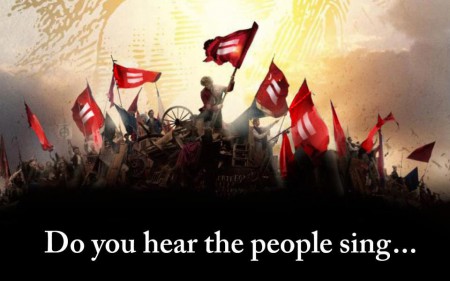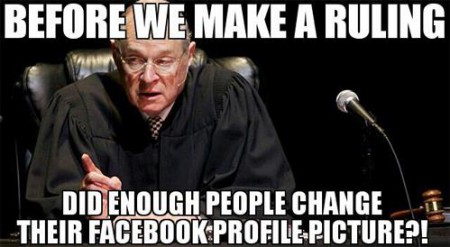If you logged into your Facebook or Twitter in the past 24 hours, you might have noticed a lot of red. In response to DOMA and Proposition 8 being argued in front of the Supreme Court, folks online are turning their profile pictures and cover photos red in support of both those laws being overturned.
I could spend this post talking about how United Methodists can support such things because of differences of doctrine within our Book of Discipline (such as para 162.J supports equal benefits under the law which is the primary concern of the DOMA challenge).
But instead, I think it is more important to talk about why this type of meme is important.
One of the counter-memes being thrown around is derisive towards this form of slacktivism, or collective actions done online to cause change in the real world. Here’s that meme:
While funny, the picture misses out on the purpose of this kind of slacktivism, which is threefold:
- Bringing folks out of the shadows and connecting them: I sat and scrolled through my friends list on Facebook, counting person after person who painted their profiles red. Some of them were obvious. Some of them were expected. Then I saw the fellow church camp counselor who painted her profile red. Then another counselor. Then a former professor. Then an elementary school friend. Then people in a United Methodist group. Then the daughter of an antagonistic clergyperson. Then a friend with a very hostile congregation who will take him to task for it. Then a high school youth group friend. Then a former youth. Then two friends IN THE SAME TOWN who didn’t know each other. With every change of a profile picture, I saw them being invited into advocacy groups–some of which are location-based (or annual conference based for Methodists). I connected some people I knew in the same rural town by via private message. The red-washing allowed for a community to emerge that otherwise might not have ever known about each other.
- Even folks who wouldn’t dare change their profile pic could see others and connect with them, finding community while maintaining discretion.
- Giving support to those still in the shadows: I got a message from a college friend who thanked me for the red-washing of my profile. I got several comments expressing joy at new-found connections. One would only have to login to see a red-washing that reminded folks that there are support networks–in churches and in towns–that can offer support. And many kinds of support will go unacknowledged but appreciated, as I saw in a comment:
“If something like this had happened when I was a kid, it would have made my day. If *one person* I knew had expressed the opinion that I was a human being who deserved respect- whether it was by wearing a shirt, or hanging a sign, or using the word gay even one time in a way that was neither derogatory nor pitying- the teenaged me would have been overwhelmed.
- Finally, reminding the other side of the shift in their numbers.
If changing a profile pic was to cause change, then I would be doing it all the time. If by changing my profile pic, I could start to fight cancer, eliminate sex trafficking, help the homeless, feed the hungry, visit the prisoner, abolish the death penalty, then I would be doing slacktivism all the time from the comfort of my armchair.
But that’s not the goal. The goal is building up a community that can then work for change. The goal is to offer a spark of support to people whom you might never meet. And the goal is to show how lonely it is getting out there…for some.
Slacktivism, properly understood in this way, isn’t a substitute for actual boots-on-the-ground activism. It actually can be described as self-centered as its power lies in the building up of the community of activism not the community being empowered. Make no illusions as to what role slacktivism has in an advocacy movement! But in the long run, this form of involvement can yield more voices for a movement, more connection, and more people with a stronger understanding of how the Internet has changed things forever…
…and that’s why we’re studying it today at HackingChristianity. Thanks for reading.




re: “solidarity vs. activism,” it doesn’t have to be an either/or, it can be, and probably is, a both/and.
… granted, the justices themselves probably don’t log onto Facebook, but their interns and staffers sure do.
Everything affects everything. (that said, clicking “like” or changing a profile pic is a rather puny form of activism, far less than writing snail mail letters to the USSC, and to our elected officials (the best way — esp. if a check is enclosed ; ), but it does stimulate a cumulative effect — that sways the masses — who are ultimately our government.
That said, our mere “symbolic campaign” has led to this! http://news.yahoo.com/corporations-paint-brands-red-lgbt-rights-171017122.html
A more careful choice of images might be in order; the historical event referenced in “Les Miserables” which was used as the basis of the painting altered to include the equality flags is the *failed* June Rebellion of 1832.
Interesting take, Jeremy. It seems like your connecting people to groups is activism. You are translating an initial gesture into a call or invitation to action. My son does this kind of work all the time in political work. People come to the office asking for a yard sign. He signs them up to volunteer to knock on doors or do a phone bank.
The criticism of this kind of meme seems unfounded to me. It is just the Internet version of kinds of organization people have been doing for generations.
That should be “you are” in the first sentence.